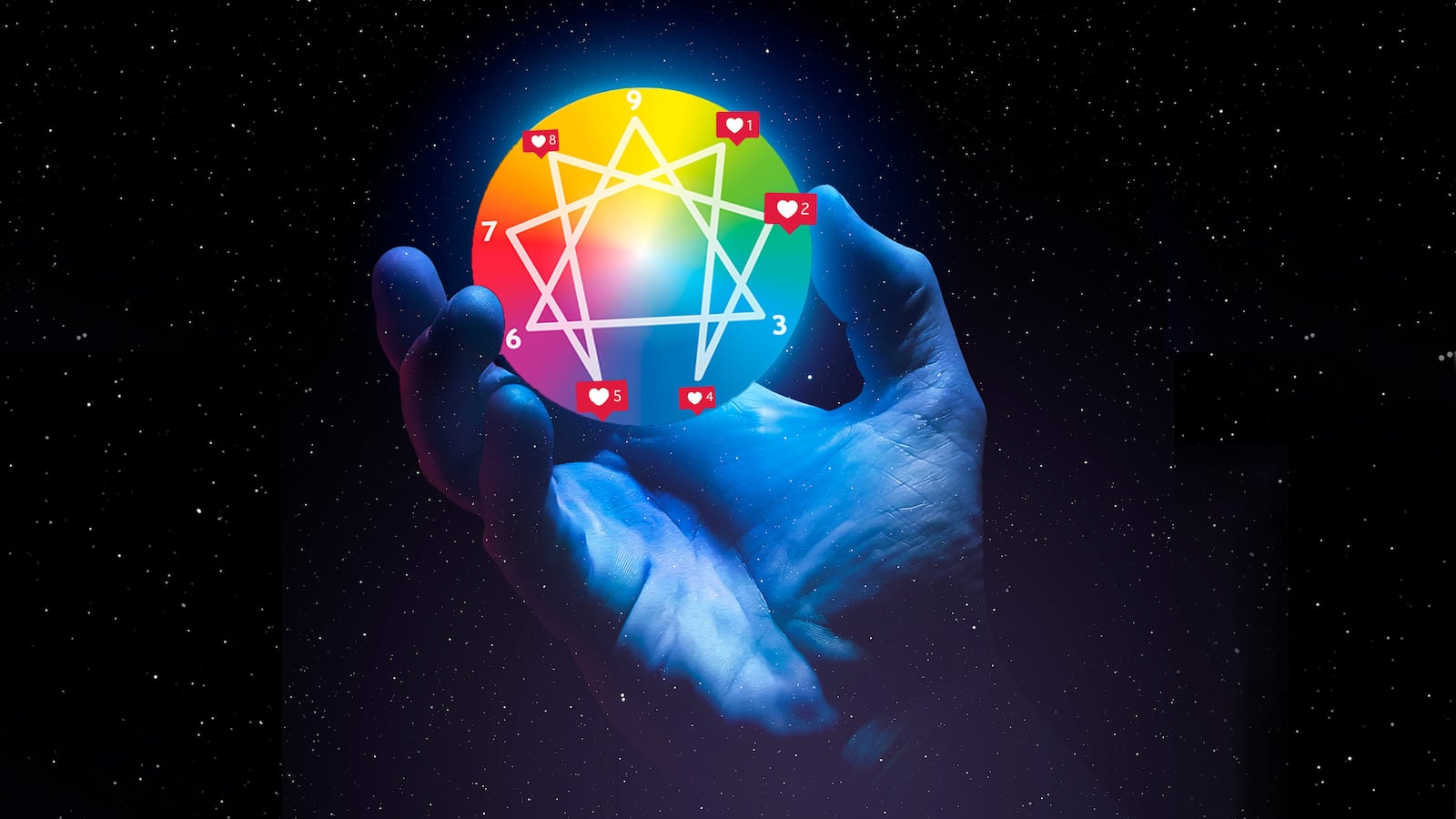A few months ago, I went day drinking with a group of unnaturally attractive humans, the kind of people who look good in baby bangs and low rise jeans. “I’m a 7,” a girl with a sleeve full of tattoos announced. “Same,” I agreed, assuming she meant shoe size and thrilled that we had something in common. Then a large man offered that he was a “4,” and I realized we weren’t talking about feet.
In a second, I’d learn that we were talking about Enneagram types, a range of nine personalities that has become a kind of “What’s your sign?” for the influencer, or influencer-adjacent, set. Someone passed me their phone and I took a 10-minute test which asked questions like whether I’m “more relationship or goal oriented” and whether I’m “methodical and cautious or adventurous and a risk-taker.”
Wanting to seem Totally Chill for my new, seemingly-poreless friends, I lied, punching in that I am “spontaneous and fun-loving” and “romantic and imaginative.” According to 9Types.com, this indeed did make me a 7, or an “Adventurer,” known for being “energetic, lively, and optimistic,” someone who “wants to contribute to the world.” (Who doesn’t? I silently countered to myself.)
Later that night, alone, my truest self bathed in computer bluelight, I retook the test. With no one to impress, I was a 4, “the Romantic,” basically a needy little bitch with “sensitive feelings.” Under “How to Get Along With Me” read truths like, “Give me plenty of compliments. They mean a lot to me” and “Don’t tell me I’m too sensitive or overreacting!”
Rude of the Enneagram to drag me like a runaway Clydesdale, but true.
The Enneagram has a hard-to-trace early history. The pseudoscience’s nine types allegedly have roots in fourth-century Christian mysticism, but it really became popular after the Armenian writer George Gurdjieff, who died in 1949, mapped out the geometric, constellatory figure. Gurdjieff taught “the Fourth Way,” a supposed path to enlightenment championed during the New Age by the Bolivian philosopher Oscar Ichazo.
Jesuit scholars in the 1970s also adopted the Enneagram in their teachings, and today the practice occupies a curious place in the cannon of self-help literature. Some therapists use the Enneagram to encourage self-reflection. Evangelical Christians believe the number can strengthen their relationship with God. Plenty of gurus use it to sell their pop psych books.
Few things can unite the religious right and Marianne Williamson supporters like the Enneagram does, probably because regardless of politics, people just like talking about themselves.
“A lot of people will often feel like they are somehow unique and alone in their experience, they are somehow ‘out there,’ and not normal,” Kim Schneiderman, a New York therapist, told me. “For those people, I find that with the Enneagram, they begin to realize certain aspects of themselves in the descriptions of personality types.”
Just as the zodiac or crystal healing has helped many a nebulously “spiritual” person find clarity amidst the chaos, the Enneagram has also developed a very online following. This presents a new cottage industry of influencers like Ashton Ober, who runs @EnneagramAshton while working her day job at the Pennsylvania Coalition Against Rape.
In middle school, Ober lived for the days she her mother would drive her to Barnes and Noble, where she ran straight to the personality test book section. “I was a diehard,” Ober, now 30, told me.
She first learned about the Enneagram two years ago, while finishing up her master’s program. Ober discovered that she is a 2, or a “Helper,” a type known for its need to give and feel love—perhaps unsurprising, given her career in social work.
Unlike the Myers Briggs Type Indicator, another character assessment Ober admits to being “obsessed with,” the Enneagram provided not just an evaluation, but an explanation. “The Enneagram tells you the motivations behind your behavior,” Ober said. “It tells you why you do the things you do. It’s more of a tool for self-growth instead of just like, here are your results, that’s that.”
Of course, that is only if one cares to deep dive into what things really mean. Others, like my day-drinking companions, might be fine explaining away their behavior with, “I’m such a 9.”
Ober posts color-coordinated info-graphics that are ripe for comments, offering guidance and relationship advice for different types. The point of these posts are, of course, to engage, and nothing gets Enneagram fans talking more than a joke that makes them feel seen or read.
“The Enneagram is not a comfortable thing,” Ober said. “It draws out characteristics about ourselves that are not always really great. A few of us who take the test are willing to go further with the results, but a lot of people don’t.”
Last summer, Ober’s account hit 20,000 followers. Today, it has over 190,000. She credits a willingness to start posting more about her personal life for that rapid growth. “I started to show myself and my face more,” Ober explained. “I hit 40,000 in September, then 100,000 in November and 175,000 in January.”
Still, Ober realizes that her content is very “niche,” and hard to monetize in the usual influencer way of sponcon and partnership deals. “I am trying my hardest, but I am not a lifestyle blogger, not going on there and saying, ‘Look what I bought today at Target,’” Ober said, though she has done some marketing for various life-coaching companies. By her own estimation, the following is “like, 96 percent women.”
Ginny Blake, 22 and a law student in West Virginia, says the Enneagram helped her through anorexia recovery. “It ended up being a helpful tool to help me analyze triggers and thinking patterns I’d been having for years, but now through a new lens,” she said. “Anorexia is largely driven by anxiety [and] I find I am most likely to relapse when I feel as though I’m losing control over some aspect of my life. Restricting becomes a default mindset in order to restore some type of control.”
Things clicked when she learned she was a Type 8, or “the Asserter,” a personality which generally fears a loss of agency. “Reading up on the ways Type 8s respond to stress has been really interesting, because it’s like getting a peek at my brain. The Enneagram became a tool in my belt to help me begin to acknowledge and unravel harmful thought patterns,” Blake said.
Blake now runs @EnneagramAndMemes, another popular account with over 160,000 followers. She believes “it is like gently roasting yourself and your friends.” Blake hopes that if she can make her followers laugh, she can inspire them to learn more about their types.
“Everyone carries with them a story that shaped and molded them into who they are [and] learning someone’s type is like getting an itty-bitty glimpse of that story,” Blake added. “Learning someone shares your type is really special, too, because all of a sudden you realize someone else thinks like you.”
Sarahjane Case, 33, runs @EnneagramAndCoffee from her home in Asheville, North Carolina. She first learned of the different types five years ago, while discussing her then-boyfriend, now-husband, with a friend. After “annoying” everyone she knew with facts about the Enneagram, Case began posting on Instagram in December 2018.
“We’re in this season of life right now where we are asking everybody to own their stuff,” Case said. “Really look at yourself and think about what you bring to the table and what is serving the world, and own that. The Enneagram basically asks you to do that directly.”
Case said that her following of nearly 560,000 is made up of “a lot of people in Nashville,” with New York and Texas being other major hubs. Despite the interest, she is adamant that “you don’t have to be your number.”
“A lot of times we think that the whole point of the Enneagram is that we have to be this in order to be loved, be OK, and be safe,” Case said. “So when we over-identify with our number, there is a sense of, ‘I do not need to change this part of myself.’ I want more for people than that.”
John Luckovich, a 32-year-old teacher at New York Enneagram, has followed the practice since a canoe trip he took as a high schooler in north Georgia. “I was friends with this woman whose dad was friends with Don Riso [who wrote the book Personality Types], and she goes, ‘John, you’re a 4,’” Luckovich said. “It ruined my life. It started this obsession that I have not diverged from at all.”
Luckovich is deeply involved in the Enneagram workshop and speaking circuit, even meeting his wife at a conference held near the Swiss-Italian border. He’s a searcher, someone who believes people need to spend years studying the Enneagram to truly understand it.
“I’m very snotty,” he joked. “With the Instagram stuff, some of the memes are funny, very few are, but some are. There are a couple of accounts I follow, but most of it makes me cringe.”
He chalks the Enneagram’s newfound prevalence down to widespread generational feelings of “hopelessness about the future.”
“I think people can instinctively feel that the Enneagram has a lot of substance to it, but it’s a far cry from recognizing that something has substance versus being able to extract that substance,” Luckovich said. “But I think there’s also a real interest in checking out what’s going on beneath the hood. How do I find something that’s fulfilling? What’s actually real?”
And of course: “Some people are attracted to the Enneagram out of pure narcissism and fascination with oneself, and that’s fine. If that’s where you’re at, that’s where you’re at.”






